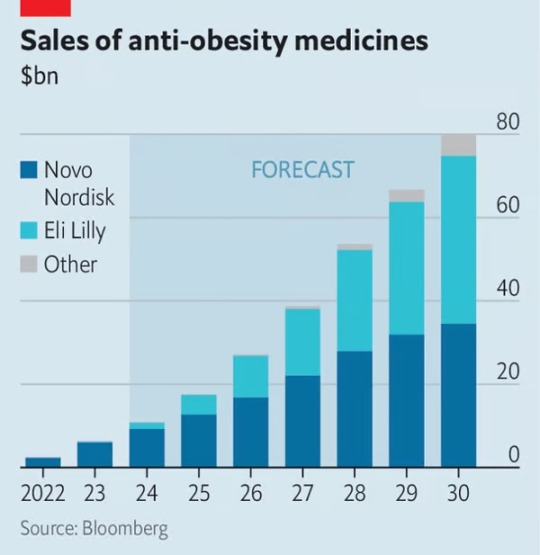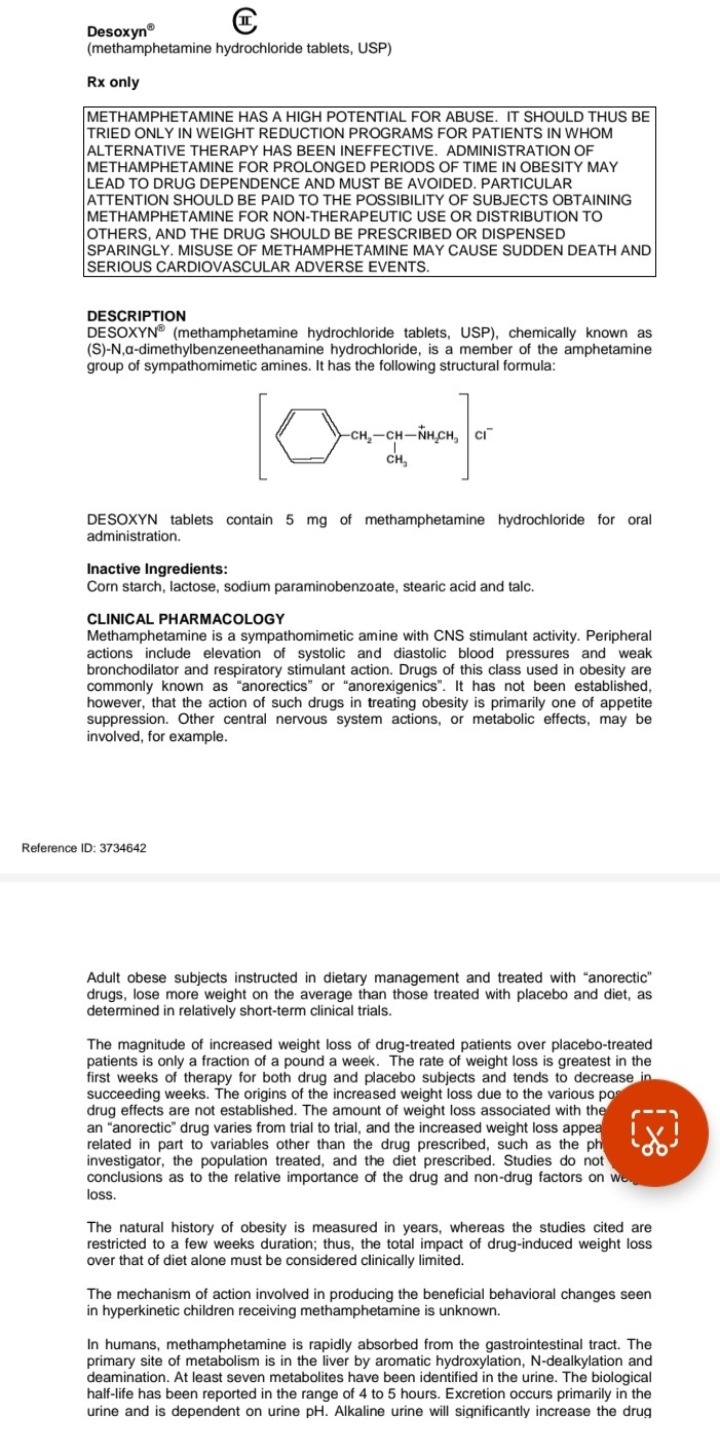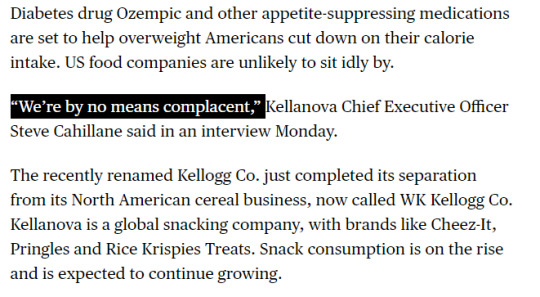#Obesity Drugs
Text
Global Obesity Drug Market to Grow 16x – Top Weight-Loss Stocks to Watch in 2024

Goldman Sachs Says "Obesity Market is Still in its Early Stages" and Projects the Sector to Grow By as Much as 16x to $100 Billion By 2030
With the weight-loss pharma sector poised for exponential future growth, here’s the skinny on the top obesity drug stocks investors should be watching.
Click Here to Read Article
0 notes
Text
A Frenzy of Innovation in Obesity Drugs is Under Way! Novo Nordisk and Eli Lilly are Printing Money Now. But They Will Not Be a Stagnant Duopoly
— March 7th 2024 | The Economist

Image: Ricardo Tomás
Weight-loss jabs have turned out to be blockbusters. And for good reason. For one thing, after centuries of false promises and quackery, these drugs actually work. With nearly half the world’s population expected to be obese or overweight by 2030, demand for them is assured. And, more excitingly, they may be approved for a broader set of uses. Clinical trials suggest that they could reduce the risk of heart attacks, kidney disease and perhaps even Alzheimer’s. By the end of the decade annual sales of obesity medicines could hit $80bn, making them one of pharma’s biggest classes of drugs.
No wonder enthusiasm for the makers of these drugs, Novo Nordisk and Eli Lilly, is at fever pitch. Since the start of 2023 Novo, maker of Wegovy (and its sibling Ozempic), has seen its market capitalisation soar by 87% to $560bn, making it Europe’s most valuable company. Meanwhile the market value of Lilly, maker of Zepbound (and its sibling Mounjaro), has more than doubled to $740bn. One of these drugmakers could be the first to attain a market value of a trillion dollars, joining an elite club mostly made up of tech firms.
Add in the limited volumes and high prices for these drugs today, and you might think that this nascent industry is on course to be a price-gouging duopoly. In fact, the market will soon look drastically different from what you see now.
Right now the drugs are in short supply. Shortages of their active ingredients, like semaglutide for Wegovy, and of the skinny “pens” used to inject the medicine, are a constraint on production. And with a list price of almost $16,000 a year, these treatments are not cheap. Although a few users may be able to afford the cost themselves, most will need help from insurers or health services—many of which have yet to be convinced that the benefits are worth the drugs’ eye-watering prices.
Access will be an even bigger problem in much of the emerging world, which is projected to experience the largest increases in obesity as incomes rise and diets change. So far most of Lilly’s and Novo’s sales have been in America, with the rest going mainly to Europe. Nor does it help emerging-world patients that the jabs need to be refrigerated, making them unsuitable for use in countries with less developed supply chains.

Image: The Economist
Yet there are good reasons to think that in future the market will see expanded supply, lower prices and a more global patient base. For a start, investment by Lilly and Novo to expand production should ease bottlenecks over time. Both firms are pouring billions of dollars into boosting supply by building their own capacity and teaming up with other manufacturers. Lilly and Novo are also racing to gain an edge over each other. Novo has already developed a pill that is about as effective as its injectable version. Lilly expects to launch its own obesity pill in a few years. Both companies also have newer versions of the drugs in the late stages of development which are more efficacious or have fewer side-effects.
More important in the long term, however, is the array of competitors preparing to enter the market. Wegovy, Zepbound and their ilk are less protected by patents than, say, Humira, a blockbuster anti-inflammatory drug that has reaped more than $200bn in sales over 20 years.
Already more than 70 companies are running close to 100 clinical trials for obesity drugs. These include big pharma firms (Amgen and Boehringer Ingelheim) and smaller biotechs (Viking Therapeutics and Structure Therapeutics) in the West, as well as Chinese drugmakers such as Sciwind Biosciences and Eccogene. Many are testing versions that are distinct enough from Wegovy and Zepbound that patent protections will not apply, allowing them to come to market within a few years, should they gain regulators’ blessing.
Some candidates in the pipeline could be more effective than existing treatments; others might do away with the inconvenience of today’s drugs, which require patients to inject themselves once a week and to continue taking them indefinitely to keep their weight down. Viking’s experimental drug, for example, has been shown to help patients shed more weight than existing jabs. Amgen is testing a treatment that does not require patients to be on the drugs indefinitely. And Structure is developing a promising-looking pill.
Healthy Competition
This frenzy of innovation is welcome. Lilly and Novo may lose their lead in the long term if cheaper alternatives arise; or they may themselves furiously innovate to reduce costs. Either way, prices should come down, making the drugs more accessible to patients around the world. Today the two pharma firms are reaping the rewards from their blockbuster drugs. But in time it will be consumers who benefit most of all. ■
— This Article Appeared in the Leaders Section of the Print Edition Under the Headline "The Real Skinny"
#Leaders | The Real Skinny#The Real Skinny#Frenzy#Innovation#Obesity Drugs#Novo Nordisk | Eli Lilly#Printing 💵 💴 💰#The Economist#Duopoly
0 notes
Text
Winning The Battle Against Obesity: The Role Of Obesity Drugs
Greetings, health-conscious readers! Today, we're delving into a topic that impacts millions worldwide – the ongoing fight against obesity. This topic is close to our hearts because, after all, who doesn't aspire to live a healthy life? In this article, we'll explore the dynamic and ever-evolving world of obesity drugs. We'll discuss the challenges, breakthroughs, and all you need to know about these vital tools in the fight against excess weight.
Know more
#obesity drugs#weight management#obesity epidemic#obesity treatment#weight loss medications#appetite suppressants#fat absorption inhibitors#metabolic boosters#hormone regulators#obesity solutions#personalized medicine#obesity research
0 notes
Text
Global Obesity Drugs Market valued at $2.3 bn (2022), is Forecasted to Witness a Lucrative CAGR of 25% by 2027
Obesity and overweight are terms which are defined as gain of additional fat thus leading to an increased risk to one's health, which can be measured by using body mass index (BMI) as a baseline. A BMI of over 30 is considered as obese and a BMI of over 25 is considered as overweight. Obesity is a key risk factor contributing to a wide number of diseases such as diabetes, heart disease, and cancer; estimated to over 650 million obese people globally by the World Health Organization (WHO).
Increasing Number of Obese and Overweight Population to Trigger the Demand of Obesity Drugs
Obesity is one of the primary contributors to a major number of non-communicable diseases such as heart disease, stroke and diabetes. World Obesity Atlas 2022, projected the growth of the global obese population to be 16.1% in 2025, almost accounting for 892 million people which will further reach 1,025 million by 2030 with a growth rate of 17.5% in 2030.
Some of the regional obesity burden estimated by World Obesity Atlas 2022 are listed as below: -
1 in each 13 men and 1 in each 5 women are estimated to be obese by 2030 in Africa, equating to approximately 27 million men and 74 million women by 2030. Of the total 101 million obese population, 34 million are estimated to have severe obesity (BMI ≥ 35).
In Americas, by 2030, growth of obesity in men is projected to be 34.41% (1 in each 3 men) as compared to 39.72% in women accounting for 298 million people in the region, out of which 128 million will have severe obesity.
Across the European region, the growth of obesity is expected to be 29.42% in men and 29.97% in women in 2030, with an estimated 102 million men and 113 million women at risk of the complications of obesity.
Competitive Landscape Analysis: Global Obesity Drugs Market
The global obesity drugs market is marked by the presence of well-established and emerging market companies such as follows: -
Novo Nordisk A/S (Denmark)
Eli Lilly and Company (US)
Altimmune (US)
Amgen Inc. (US)
Boehringer Ingelheim (Germany)
Innovent Biologics, Inc. (China)
AstraZeneca plc (UK)
Pfizer Inc. (US)
Irrespective of the arising market challenges such as severe effects associated with weight management medicines such as nausea and diarrhea and shortage of combination therapies, the obesity drugs market has a decent potential to grow at a lucrative rate and is poised to gain a consistent momentum in the upcoming years due to a strong focus on new product development, wide acceptance in developing regions, impact of social media campaigns, and declining pricing trend due to competition, among others.
GET Detailed Insights on Obesity Drugs Market Report @ https://meditechinsights.com/global-obesity-drugs-market/
#Obesity Drugs#obesity#overweight#overeating#Obesity Drugs Market#Obesity Drugs Market Size#Obesity Drugs Market Share#Obesity Drugs Market Growth#Obesity Drugs Market Consumption#Obesity Drugs Market Report#Obesity Drugs Market Demand
0 notes
Text
South Park did a parody of the lost boys
#80s#80s movies#the lost boys#the lost boys 1987#david the lost boys#paul#marko#dwayne#david tlb#south park#star tlb#kiefer sutherland#south park the end of obesity#south park randy#eric cartman#stan marsh#kyle broflovski#kenny mccormick#original movie#parody#matt stone#trey parker#joel schumacher#tw drugs
83 notes
·
View notes
Text
somewhat niche academia rant of the day: a lot of basic science research is quite separate from the actual health application to humans, which is . fine and i personally want to do basic research not translational so i get it. but i feel like a lot of these researchers lack compassion for the people that their work is ultimately about/for. was thinking about this bc i went to a lecture that i was quite excited about. the speaker was studying why a disease has a more severe impact on obese people. and even though she wasn’t really talking about application to (human) patients it was so clear just from the figures she had on her slides that she had no compassion for this population and seemed fatphobic. left feeling really dismayed with the whole event and renewed belief that we need to teach science in context and care about the translation for impacted populations-even if that’s not the goal of our day-to-day research- beyond what we write in grants.
#in basic science we often get bothered ‘what is application how are u gonna make drugs from this!’#and its like well im not making medicine im trying to learn about weird biology shit.#and theres absolutely nothing wrong w that. but if youre going to study something that impacts/concerns human beings have some compassion#like why study obese populations if u are fatphobic! why would u dedicate ur career to that! funding i guess? i dont get it!#i went with two of my labmates. one afterward was like wow that was great. the other one independently was like wtf was wrong w her#was very validating that he also noticed and was disgusted
10 notes
·
View notes
Text

Straight facts: art of prototype fredbear isn't good if he's not doing his famous gag: smoking scp-420-J/J
I do it less nowadays since I feel like I may actually get in trouble with parents who have children who think that they have a bunch of freedom xD
…I don't care, my art isn't made for kids and this is one of the reasons, another reason is disturbing imagery including blood & gore.
I added Obese and Shadow Man’s tank in the background judging by the fact they live where proto lives in my canon.
#five nights at prototype fredbear’s#fnapf#fnaf#five nights at freddy's#prototype fredbear#obese and shadow man#tw: drugs#tw: smoking
3 notes
·
View notes
Text
Today's fucked up fatphobia fact of the day:
Sometimes doctors prescribe real, actual meth to fat patients to "help" them lose weight.


Imagine being a real medical doctor with an actual degree in medicine and going "you're too fat, do some meth about it"
24 notes
·
View notes
Text
im gonna be so fr with yall i think the new special sucked.
#some of the jokes were good but it wasnt particularly better than any of the other specials comedy wise#and it was a load of misinformed fatphobic bullshit#like i was hoping they would touch on the fact that a lot of obesity drugs supress appetite to an unealthy amount#and talk about the onset of eating disorders that can come from it#but this special was like.... extreme disgust for fat people#and like#most of their fat jokes were pretty mild in the past. they werent as direct and.... full of disgust/hatred as these ones were#anyway my point is i didnt like the special#i think it was shit and it definitely doesnt live up to some of the other ones they've had in the past#it gave me the same terrible feeling that garrisons new vagina gave me on my first watch#southpark#south park#the end of obesity#sp#colby rambles#sp kyle#sp stan#sp eric#sp eric cartman#eric cartman#sp butters
4 notes
·
View notes
Text

I can't wait for the Ozempic fad to die out (which it will given how expensive it is and how many side effects are already showing up) so I don't have to be subjected to it. (x)
#If you want to lose weight#the 3S's are a fantastic option: SoulCycle#[solidcore]#and salad.#Personal#links#also it's never the people who are like 100 pounds overweight who are most pro Ozempic#it's the people who are like 10-15 pounds from their goal weight who just don't want to expend the necessary effort to lose that weight#I understand the benefit of weight loss drugs for like morbidly obese people#but like MINDY KALING was never morbidly obese she just wanted to be thin#and you can see the Ozempic use on her face
12 notes
·
View notes
Text
The Ozempic Olympics: Hollywood is Ruining Our Health
youtube
D'Angelo's best video yet! Finally a discussion on obesity that isn't cringey af
#dangelo wallace#youtube video essay#ozempic#weight loss tips#obesity epidemic#fatphobia is ableism#body neutrality#misogynoir#misandrist beauty standards#big pharma#capitalism gone wrong#drug abuse#mental health#i know the tags read like mad libs but they are all discussed in the video#its nutritionally dense#Youtube
5 notes
·
View notes
Text
anya weight talk diary entry 2
(trigger warning)
over the last year and a half, i've seen a number of tweets and articles critical of the use of GLP-1 drugs for weight loss that essentially boil down to the overly sentimental idea of "ozempic is an appetite suppressant, it reduces the very human desire for food (and alcohol, and nicotine, and other substances or activities that could be addictive), and doesn't that desire, that want, make us oh so human? isn't that what ~humanity~ is about????"
and i just can't stand it. i really can't. it's so disingenuous and precious to me.
in a few minutes, i'll go to my kitchen and inject myself with zepbound for the third time. i'm entering my third week with it, i'm on 2.5mg at this point, and it's been great! what a fucking RELIEF to not be thinking about food constantly! for me, at this dosage, the effect is subtle, but still noticeable and meaningful. i still ate a whole bacon cheeseburger, with fries and a chocolate milkshake, this afternoon, and i LOVED it. but the thing is that even though i ate that burger 5 hours ago, i'm not hungry for another meal yet! and i cannot overstate how much of a relief that is. there are whole swaths of my day where i simply do not think about food because i am not hungry, and it's as simple as that. but when i do get hungry, and i tuck into a delicious meal, i really and truly enjoy it, just like i always have.
at this low dose, i'd say that i'm only eating between 10-20% less per meal than what i was typically eating in a meal prior to going on this medicine. the real difference i've noticed is that i can go from lunch midday to dinner at 7pm with only an apple as a snack in between.
i just can't stand the idea that constantly battling with a hyperfixation that has become destructive to you in some capacity is the correct, human thing to do. not everything has to be such a fucking slog. sometimes it's okay to make things easier on yourself.
(my mom has been on a GLP-1 drug for at least the last 7 years for her type 2 diabetes, and she's not some ascetic freak of nature. jesus. she's lost about 70 pounds, very gradually over the years, and it's been great for her. and she still can chow down when she wants!)
(also i'm the same level of horny as i've always been, thank you very much. i'm jacking off just fine, and multiple times a week, just in case you were *concerned*.)
#moimoianya#anya weight talk diary#i have more to say about the stigma associated with fat people using these drugs for weight loss#and how much of that stigma is being driven by people who are NOT obese#and how much i hate that#but that's for another post
4 notes
·
View notes
Text
public health policy about obesity: hey we've tried this thing repeatedly over the last 3 decades and every time it has been ineffective at best and actively harmful at worst. clearly that means we should do it more
#war on obesity 🤝 war on drugs#'evidence based policy' is supposedly all the rage except for when the evidence doesn't match what people think should work
25 notes
·
View notes
Text
I did some self analyzing and I feel like where other people have daddy issues I have big brother issues because growing up all that fucker ever did way bully me, he still does a lot of times, and when I was bullied in school by my classmates he just kind of stood by and never stepped up for me when I couldn't defend myself or the teachers chose to ignor me. Not even when when Jonas that fucking asshole took a lighter to my hair at the bus stop.
And I dunno I guess I just kind of get over attached to characters in videogames that give me "cool older sibling" vibes. Like I'm not thirsting over them but I like them more than just as a neat character and I feel like they would have knocked Jonas' stupid ass teeth out one by one for what he fucking did if they had been there instead of my actual brother and not just stood there cosplaying as a lamppost and even laughed about it.
#this is about wrench. and zer0. and kerry eurodyne. and cayde-6. and dorian. and ezio. and ratonhnhaké:ton/connor. and farkas and vilkas.#jonas got in trouble a year or two ago for drugs and cracking open a very expensive car and trashing it btw :D#fucker was notorious for bullying girls he didn't find attactive#which says a lot about him because the only girls in class he didn't bully were also the only ones that had bullemia#they'd hide in the bathrooms for the entire rest of the lunchbreak to purge together#and called other girls obese when they couldn't touch their fingertips in front of their belly button if they put their hands on their hips#I find it kinda funny how the dudes that tend to fatshame the most are the ones that have fat mothers#I'm saying this as a dig at the hypocracy of the dudes by the way#like if they talk like that to strangers then I don't want to know what kind of verbal abuse their mothers have to suffer at home#honestly if 13 year old me was fat in his eyes then what the hell was his own mother to him#His mother is really lovely by the way she works as a doctors assistand at a kids clinic and part times as a waitress in a café#and feel seriously sorry for her because you can tell that she tries so so hard and her son just completely disregards all the work she doe#in favour of trying to be “cool with the boys” and a “alpha male” and all that kind of shit.#tw ed
1 note
·
View note
Text

the funny thing is that i don't think younger people - and i mean those under the age of 40 - really have a grasp on how many of today's issues can be tied back to a disastrous reagan policy:
war on drugs: reagan's aggressive escalation of the war on drugs was a catastrophic policy, primarily targeting minority communities and fueling mass incarceration. the crusade against drugs was more about controlling the Black, Latino and Native communities than addressing the actual problems of drug abuse, leading to a legacy of broken families and systemic racism within the criminal justice system.
deregulation and economic policies: reaganomics was an absolute disaster for the working class. reagan's policies of aggressive tax cuts for the rich, deregulation, and slashing social programs were nothing less than class warfare, deepening income inequality and entrenching corporate greed. these types of policies were a clear message that reagan's america was only for the wealthy elite and a loud "fuck you" to working americans.
environmental policies: despite his reputation being whitewashed thanks to the recovery of the ozone layer, reagan's environmental record was an unmitigated disaster. his administration gutted critical environmental protections and institutions like the EPA, turning a blind eye to pollution and corporate exploitation of natural resources. this blatant disregard for the planet was a clear sign of prioritizing short-term corporate profits over the future of the environment.
AIDS crisis: reagan's gross neglect of the aids crisis was nothing short of criminal and this doesn't even begin to touch on his wife's involvement. his administration's indifference to the plight of the lgbtq+ community during this devastating epidemic revealed a deep-seated bigotry and a complete failure of moral leadership.
mental health: reagan's dismantling of mental health institutions under the guise of 'reform' led directly to a surge in homelessness and a lack of support for those with mental health issues. his policies were cruel and inhumane and showed a personality-defining callous disregard for the most vulnerable in society.
labor and unions: reagan's attack on labor unions, exemplified by his handling of the patco strike, was a blatant assault on workers' rights. his actions emboldened corporations to suppress union activities, leading to a significant erosion of workers' power and rights in the workplace. he was colloquially known as "Ronnie the Union Buster Reagan"
foreign policy and military interventions: reagan's foreign policy, particularly in latin america, was imperialist and ruthless. his administration's support for dictatorships and right-wing death squads under the guise of fighting "communism" showed a complete disregard for human rights and self-determination of other nations.
public health: yes, reagan's agricultural policies actually facilitated the rise of high fructose corn syrup, once again prioritizing corporate profits over public health. this shift in the food industry has had lasting negative impacts on health, contributing to the obesity epidemic and other health issues.
privatization: reagan's push for privatization was a systematic dismantling of public services, transferring wealth and power to private corporations and further eroding the public's access to essential services.
education policies: his approach to education was more of an attack on public education than anything else, gutting funding and promoting policies that undermined equal access to quality education. this was, again, part of a broader agenda to maintain a status quo where the privileged remain in power.
this is just what i could come up with in a relatively short time and i did not even live under this man's presidency. the level at which ronald reagan has broken the united states truly can't be overstated.
78K notes
·
View notes
Text
GLP-1’s Role in Altering Taste Sensitivity Among Obese Women: A Breakthrough Discovery
Semaglutide improved taste sensitivity, changed gene expression in the tongue that’s responsible for taste perception, and changed the brain’s response to sweet tastes, according to research presented Saturday at ENDO 2024, the Endocrine Society’s annual meeting in Boston, Mass.
“People with obesity often perceive tastes less ‘intensely,’ and they have an inherently elevated desire for sweet and…

View On WordPress
0 notes